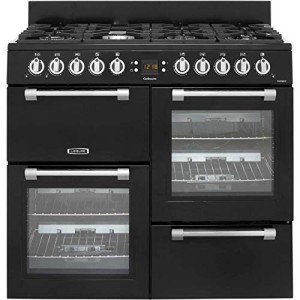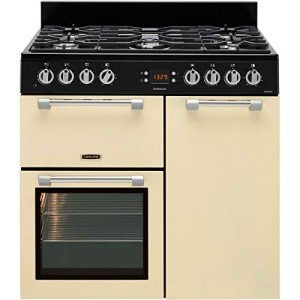Gas range cookers are a fantastic choice for anyone who loves to cook. They heat up quickly and give you great temperature control, so you can whip up your favorite dishes just the way you like them. Plus, many models come with extra features like built-in ovens and griddles, making them super versatile for your kitchen.
Gas Range Cookers
Experience the perfect blend of style and performance for your culinary creations
Product List


When it comes to choosing the right cooking appliance for the modern kitchen, a gas range cooker often tops the list for both professional chefs and passionate home cooks. Known for their precise temperature control, instant heat, and versatility, gas range cookers remain one of the most reliable and popular options available today.
This comprehensive guide will explore everything you need to know about gas range cookers: their benefits, key features, comparisons with other types of cookers, buying considerations, and maintenance tips.
What is a Gas Range Cooker?
A gas range cooker is a freestanding cooking appliance that combines both a hob (cooktop) powered by gas burners and one or more ovens below. The use of gas provides immediate heat and allows fine control over cooking temperatures, making it a top choice for those who love precision in their culinary techniques.
Unlike built-in hobs and ovens, a gas range cooker is a standalone unit that often comes in various widths, finishes, and configurations, offering flexibility in kitchen design.
Advantages of Gas Range Cookers
Gas range cookers bring several advantages to a home kitchen that make them highly sought after:
-
Instant Heat Control
Gas burners ignite instantly and allow precise adjustments to the flame, giving better control compared to electric alternatives. -
Even Cooking
Gas ovens distribute heat more evenly, reducing the chance of hot spots and ensuring consistent cooking results. -
Energy Efficiency
Gas cooking is often more energy-efficient than electric, particularly with hobs, as the energy transfer is immediate. -
Versatility
Many gas range cookers come with multi-functional ovens, optional grills, and even dual-fuel options (gas hob with electric oven), offering flexibility for different styles of cooking. -
Durability
Most models are built with robust cast iron pan supports and stainless-steel finishes, making them long-lasting.
Gas Range Cooker vs. Electric Range Cooker
To better understand why one might prefer gas over electric, here’s a comparison:
| Feature | Gas Range Cooker | Electric Range Cooker |
|---|---|---|
| Heat Control | Precise, instant | Slower adjustments |
| Operating Cost | Usually cheaper (in areas with gas supply) | Can be higher depending on electricity rates |
| Cooking Style | Preferred for quick and high-heat cooking | Better for steady, consistent baking |
| Oven Heat | More humid environment | Drier heat, ideal for baking |
| Maintenance | Easy to clean burners and grills | Smooth top easier to wipe, but harder to repair |
| Power Source | Requires gas line | Requires electric outlet |
Key Features to Look for in a Gas Range Cooker
When shopping for a gas range cooker, here are some features to consider:
- Number of Burners: Standard models come with 4 burners, but larger ones may include 5–7, along with wok burners for higher heat.
- Oven Types: Single, double, or multifunction ovens may be available.
- Size: Typically ranges from 60cm standard to larger 90cm or 110cm models for professional-style kitchens.
- Safety Features: Flame failure devices (automatically shutting off gas if flame goes out) are essential.
- Design and Finish: Stainless steel, enamel, or glass finishes to suit different kitchen styles.
- Dual-Fuel Options: Some models combine a gas hob with an electric oven for the best of both worlds.
Popular Brands of Gas Range Cookers
| Brand | Known For | Price Range |
|---|---|---|
| Rangemaster | Traditional British craftsmanship, wide range of designs | Mid to High |
| Belling | Affordable, family-friendly models | Budget to Mid |
| Smeg | Stylish Italian design, retro-inspired finishes | Mid to High |
| Stoves | Multi-oven designs, robust build | Mid to High |
| Falcon | Professional-grade, durable range cookers | High |
Practical Considerations Before Buying
When selecting a gas range cooker, buyers should keep the following considerations in mind:
- Kitchen Space – Measure the available space carefully to accommodate the cooker’s width and ensure ventilation.
- Gas Supply – Confirm that your kitchen has an appropriate gas line or connection.
- Cooking Style – Choose the right oven type (conventional, fan-assisted, or dual-fuel) depending on your preferred cooking methods.
- Budget – Set a budget that accommodates not only the purchase price but also installation costs.
- Energy Efficiency – Look for models with high energy ratings to reduce utility bills.
Maintenance and Cleaning Tips
To prolong the life of a gas range cooker, maintenance is important:
- Regular Burner Cleaning: Remove and wash burner caps regularly to prevent blockages.
- Wipe After Every Use: Food spills on enamel or stainless steel surfaces should be cleaned immediately.
- Check Gas Safety: Have the appliance inspected periodically by a qualified technician.
- Use Appropriate Cleaning Products: Non-abrasive cleaners protect finishes and glass surfaces.
Pros and Cons of Gas Range Cookers
| Pros | Cons |
|---|---|
| Instant and precise heat control | Requires gas connection |
| Lower operating costs (in most areas) | Can be bulkier than built-in appliances |
| Great for fast cooking and searing | Humid oven environment may not suit all baking |
| Durable and long-lasting designs | Some models require professional installation |
| Available in various configurations | Cleaning burners can be time-consuming |
Frequently Asked Questions (FAQ)
Q1: Are gas range cookers safe to use?
Yes, modern gas range cookers come with safety features such as flame failure devices, which automatically cut off the gas if a flame goes out. Proper ventilation and regular maintenance enhance safety.
Q2: Do gas ovens cook differently from electric ovens?
Yes, gas ovens often create a more humid cooking environment, which can be ideal for roasting meats but less effective for dry baking. Electric ovens, by contrast, provide consistent, drier heat.
Q3: What is the lifespan of a gas range cooker?
With proper use and regular maintenance, a gas range cooker can last 10–15 years or even longer.
Q4: Can I install a gas range cooker myself?
For safety reasons, gas appliances must be installed by a qualified engineer, ensuring they comply with regulations and safety standards.
Q5: Is a dual-fuel range cooker better than an all-gas model?
It depends on cooking preferences. Dual-fuel cookers give the precision of a gas hob with the consistency of an electric oven, offering versatility for different cooking styles.
Gas range cookers remain a staple in many households thanks to their reliability, efficiency, and cooking precision. Whether it’s simmering delicate sauces, searing meats at high heat, or preparing family-sized meals in a large oven, these appliances deliver excellent performance across the board.
By carefully considering features, space requirements, and personal cooking habits, buyers can find the perfect gas range cooker to suit their kitchen and lifestyle. And with proper care, a good-quality model can provide outstanding service for over a decade.